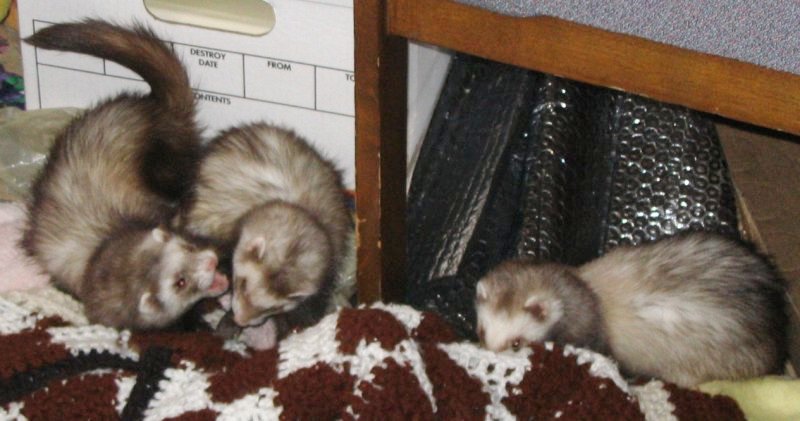
Merry Christmas and a Happy New Year! Good luck keeping your fuzzies away from the Christmas tree and out of the holiday sweets!
Hello! You're here because you wanted to read something about ferrets. Well, in about ten seconds you'll be taken to our new site, where all this information is-- just look at the table of contents on the side, and you'll find it!


 Ferrets need toys, right? But what sort of toys are ferret-friendly, and what type of toys do ferrets like to play with? Though every ferret has its own toy preference - some prefer hard rubber toys while others prefer stuffed animals, some go crazy for cat jingle balls while others prefer squeaky toys, there are some basic guidelines to picking toys that are ferret safe. Generally, any toy that can be easily torn or pierced, such as foam or cheap bouncy balls, are not safe for ferrets as their strong jaws and sharp teeth will enable them to rapidly destroy and possibly ingest portions of the toy, leaving your ferret at risk of intestinal blockage and leaving you with either a hefty vet bill or a dead pet. Another thing to keep in mind while searching for suitable ferret toys is this: if it can be cut off with scissors, it can be removed just as easily by a playful ferret. It is also important to remember that even though some toys are labeled as "ferret toys", they may not be ferret safe. Personally, I have had luck with dura-balls and kongs designed for small dogs. Some ferret owners buy and adapt small stuffed animals for their ferrets by removing eyes and whiskers as well as any other small parts that the ferret may remove. One of my ferrets went crazy for squeaky latex dog toys, but because these toys are so soft and easily destroyed, he was only allowed to play with them under direct supervision with the toy being taken away and checked for holes every ten minutes or so. Regardless of how ferret safe a toy may appear when you first purchase it, it is important to check the toy regularly for wear and get rid of it once it begins to show sign of ferret-caused damage - it is after all less expensive to buy a new toy than pay for an emergency vet trip! Now that you know what to look for, enjoy your search for toys and good luck!
Ferrets need toys, right? But what sort of toys are ferret-friendly, and what type of toys do ferrets like to play with? Though every ferret has its own toy preference - some prefer hard rubber toys while others prefer stuffed animals, some go crazy for cat jingle balls while others prefer squeaky toys, there are some basic guidelines to picking toys that are ferret safe. Generally, any toy that can be easily torn or pierced, such as foam or cheap bouncy balls, are not safe for ferrets as their strong jaws and sharp teeth will enable them to rapidly destroy and possibly ingest portions of the toy, leaving your ferret at risk of intestinal blockage and leaving you with either a hefty vet bill or a dead pet. Another thing to keep in mind while searching for suitable ferret toys is this: if it can be cut off with scissors, it can be removed just as easily by a playful ferret. It is also important to remember that even though some toys are labeled as "ferret toys", they may not be ferret safe. Personally, I have had luck with dura-balls and kongs designed for small dogs. Some ferret owners buy and adapt small stuffed animals for their ferrets by removing eyes and whiskers as well as any other small parts that the ferret may remove. One of my ferrets went crazy for squeaky latex dog toys, but because these toys are so soft and easily destroyed, he was only allowed to play with them under direct supervision with the toy being taken away and checked for holes every ten minutes or so. Regardless of how ferret safe a toy may appear when you first purchase it, it is important to check the toy regularly for wear and get rid of it once it begins to show sign of ferret-caused damage - it is after all less expensive to buy a new toy than pay for an emergency vet trip! Now that you know what to look for, enjoy your search for toys and good luck!

